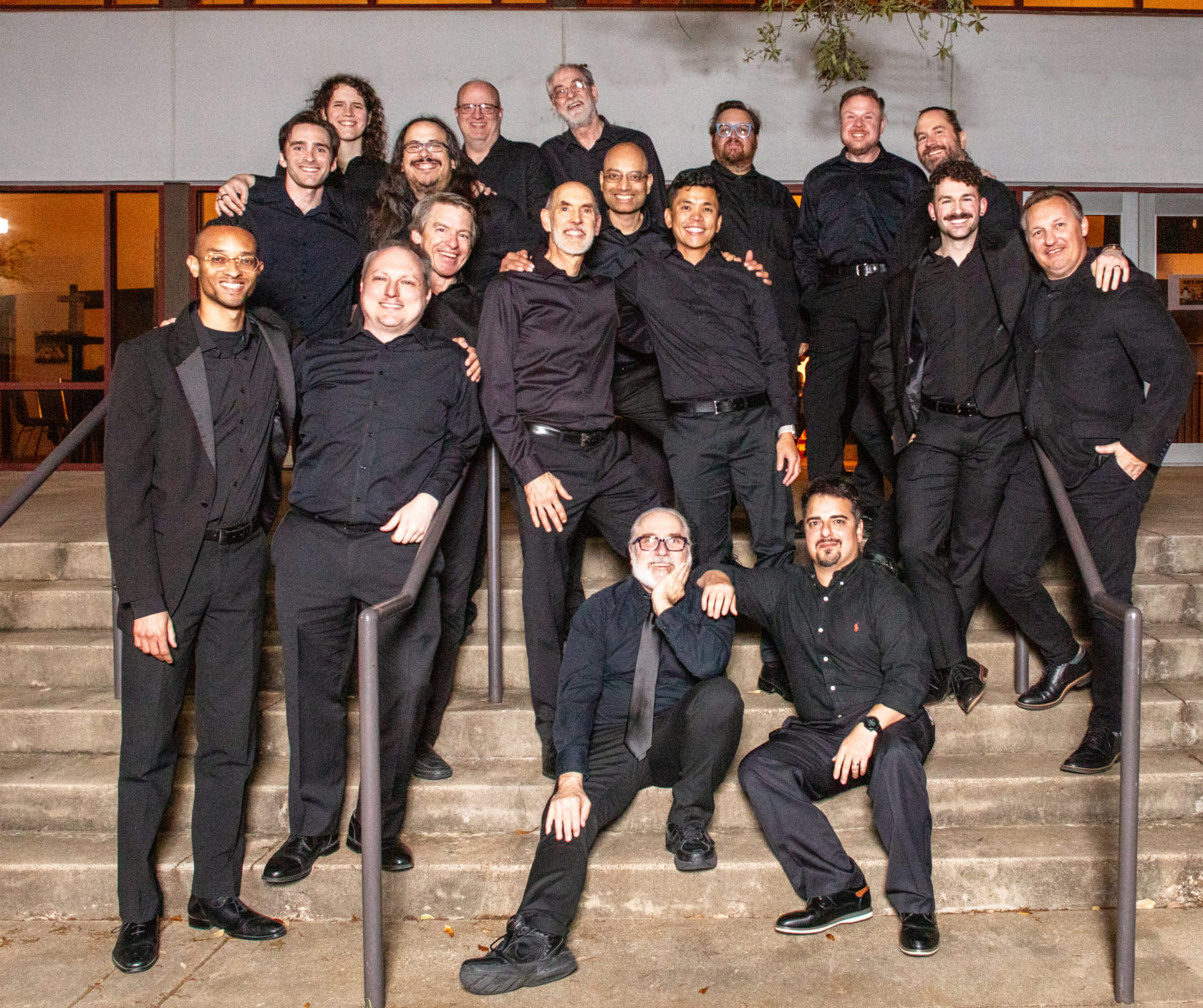
Pictured: Conspirare Symphonic Choir tenor section. Mark is on the back row, end of the row on the right-hand side Photo credit: Sandy Carson.
Mark Wischkaemper serves as a section leader in Conspirare’s Symphonic Choir and is Director of Music at St. David’s Episcopal Church. He recently graduated with his Master of Music in Choral Conducting from Texas State University. Mark has had the unique opportunity to study under Craig Hella Johnson—both in the studio and from the inside of the Symphonic Choir. In this reflection, Mark shares how the lessons learned through both his formal studies and his weekly rehearsals have shaped his understanding of the conductor’s profound responsibility to composers, singers, listeners, and the transformative power of choral music. Read on for Mark’s insights.
Uncle Ben, at the beginning of Peter Parker’s life as Spider-Man, looked at his young nephew and said words which have resonated throughout society globally:
“with great power comes great responsibility.”
Few people in music have the power of the conductor.
The conductor makes or breaks a piece. Careful study of solid sources and the score can lead to revelations in performance otherwise unheard. Rapid assumptions or bad information can lead to a trainwreck. Good rehearsal technique which inspires the singers to bring their very best can lift a listener into the air with an experience transcending the mortal world. Bad rehearsal technique and abuse leads to flat performance and emotionless response. Finally, clarity of intent – through rehearsal and gesture – lead to a relationship between conductor and ensemble, creating efficient, fulfilling rehearsals and satisfying results. Lack of clarity – both in description and gesture – leads to confusion, muddiness, and singers unlikely to return to the ensemble.
When I started my Master’s degree program at Texas State University in the fall of 2022, Craig Hella Johnson was nothing but a legend in my mind. I became a singer in large part because I heard Chanticleer sing when I was a child – this man was their music director for a time. One of my first jobs in choral music was the Choral Manager for SACRA/PROFANA, a professional choir in San Diego, whose artistic director modeled the group after Conspirare. Then I got a text message I still have –
“Hi, Mark. This is Craig Hella Johnson. I’m looking forward to working with you! When do you have some time for a coffee and sit down so we can get to know each other better?”
My heart just about leapt out of my mouth.
But that’s Craig. He holds being a Conductor – the immensity of it, the power of it, in this humble, friendly, easy shell. In our first meeting, we discussed the power a conductor wields, and how each one of us must decide how we approach every piece we conduct. And that great responsibility? It comes from honoring the composer’s intent – we don’t make the piece sound how we want. We reveal the composer’s intent to the audience, through study, rehearsal, and performance.
Aside from shared pulse, no other lesson is as consistent in Craig’s mentorship. Standing in his studio, trying to relax and make sure I get the crazy mixed meter section of whatever piece he’s assigned me correct in my pattern, Craig is quietly, patiently, and calmly reminding me of my fidelity to the composer and their intention for the piece. Is my gesture communicating the style? The expectation? If not, how do I change it to better reflect the goals of the composer?
But few things help demonstrate these large, important lessons more than seeing them in practice – and serving as a Section Leader in Conspirare’s Symphonic Choir has given me a front-row seat to how Craig holds that power and carries that responsibility. I see, in practice, with some of the best singers in Austin, how he steers this ship, inspires us, and remains fun and supportive while never wavering in his fidelity to the piece and the composer.
The joke going around my work when I started school was “after two years of conducting lessons with Craig Hella Johnson, you’ll probably be a pretty good conductor.” Nothing could be more true – it’s impossible to not learn from the man, who is constantly teaching, constantly imparting wisdom, and most importantly, constantly inspiring you to become the best you you can be. But without sitting in rehearsal, week after week, struggling with learning parts and names and catching all the notes and making all the markings and learning all the names and trying my best to help lead, I wouldn’t have gotten nearly as far as I have. Seeing the work in practice took it from theory, ideas, academic discussion, to practical, on-the-ground processes I can take to my day job.
And those lessons resonate out. The rigorousness of score study and dedication to revealing the composer’s intent I learned from my time in Craig’s studio bleeds into my work as the Music Director of the oldest church in Austin, St. David’s Episcopal Church, which was founded in 1848. Much of that work is never seen, but the choir knows when I stand in front of them, I have grasped for as much of it as I can, and I am bringing all of that information to bear as I help them sing the best they can.
But it’s larger than music – larger than score study, than rehearsal, than performance. We like to say in Conspirare what we do is important – it’s vital work, it’s lifeblood. Music feeds us through its universality, its power, and its timelessness, as well as its shared pulse. The community created in a choir is unlike any other type of ensemble or team, and that importance never leaves Craig when he’s leading us. It’s something I try to hold and share with my choir every week.


